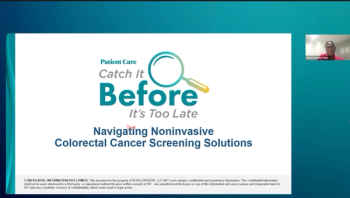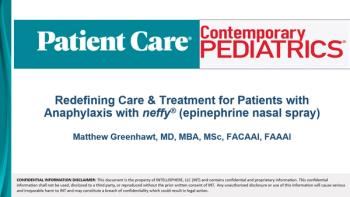
Panelists discuss how NK receptor antagonism provides a targeted, nonhormonal strategy that addresses the physiological root of vasomotor symptoms.

Panelists discuss how NK receptor antagonism provides a targeted, nonhormonal strategy that addresses the physiological root of vasomotor symptoms.

Panelists discuss how limited treatment options and systemic barriers underscore the urgent need for accessible, targeted therapies for vasomotor symptoms.

TMS 2025: Katrina Wugalter, MA, discusses research showing that age—not menopause stage—drives brain volume decline, and how lifestyle factors can help preserve brain health in midlife women.

TMS 2025: Regina Castaneda, MD, explains why reproductive stage is a critical variable in obesity and metabolic research.

TMS 2025: Dr Marla Shapiro doesn't start perimenopausal therapy without an answer to the most important question: "What is your most bothersome symptom?"

Panelists discuss how vasomotor symptoms undermine physical comfort, sleep, and long-term health, emphasizing integrative management to restore overall quality of life.

Panelists discuss how hormonal decline and KNDy neuron overactivation drive vasomotor symptoms and inform the development of targeted neurokinin receptor therapies.

Lisa Larkin, MD, discusses how elinzanetant may change menopause management for women who can’t use hormone therapy and what PCPs need to know.

"If you don't know where your keys are, that's fine." Shapiro's memorable analogy helps distinguish perimenopause brain fog from serious cognitive concerns.








TMS 2025: Cochrane explains the impetus behind 2 studies she has authored on the patient- and provider-level factors that influence MHT prescribing.

New research from TMS 2025 covers menopause effects on brain volume, hormone therapy's role in weight loss with GLP-1s, and dense breast screening updates.

Early breast cancer screening at age 40, especially with 3D mammograms, significantly improves survival rates and quality of life, according to Dr Plecha.

Menopause specialist Caroline Mitchell, MD, MPH, explains the dual nature of the breakdown in communication that can leave women virtually uninformed about GSM and treatment.

Jiang shares how to use new autoimmune risk data responsibly—identifying high-risk patients while avoiding unnecessary hormone therapy phobia.

Dr. Daniel Jiang shares unexpected research findings showing hormone therapy increased autoimmune disease risk across 15 of 17 conditions in postmenopausal women.

TMS 2025: Jiang explains why he investigated hormone therapy's effect on autoimmune disease risk in postmenopausal women.






TMS: Half of postmenopausal women suffer from GSM, yet only 25% seek treatment. Mitchell, an expert in vulvovaginal health, explains the gap and its impact on women.

Subtle sleep, mood, and cycle changes may herald perimenopause. Dr. Marla Shapiro discusses how clinicians can recognize and address them early.